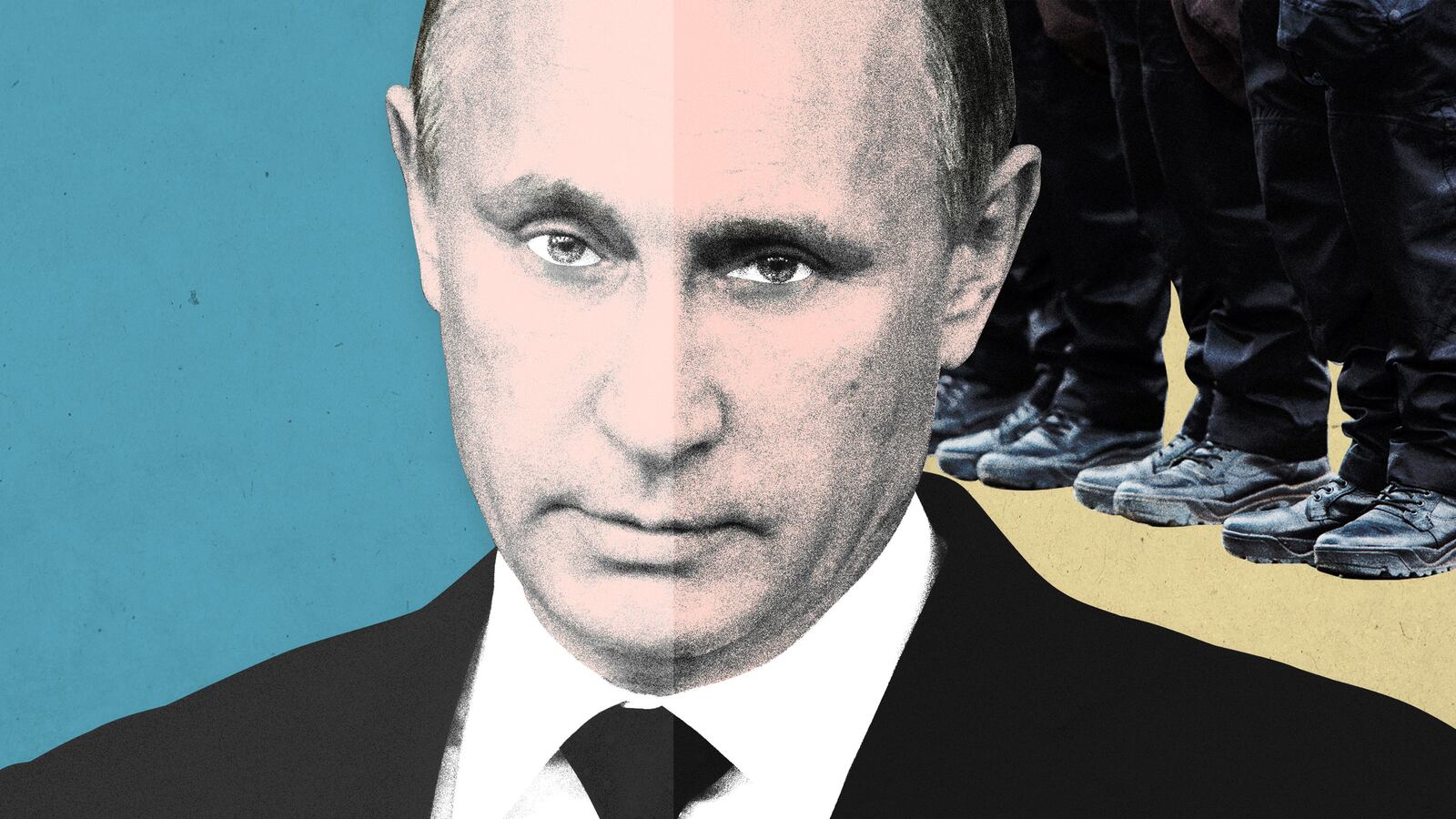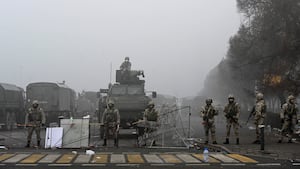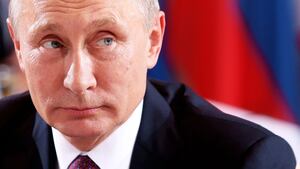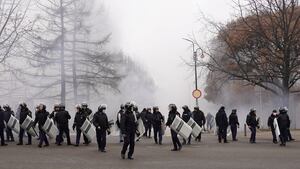MOSCOW—The sixth day of violent unrest devolved into a massacre on the streets of Kazakhstan’s capital city of Almaty, with dozens of protesters and at least 13 law enforcement officials killed, as well as hundreds more wounded.
President Kassym-Jomart Tokayev—who just a week ago was considered a weak shadow of Kazakhstan’s now-ousted Security Council Chairman Narsultan Nazarbayev—admitted he was the one who had given local security forces the order “to shoot to kill” protesters without warning on Thursday. Never before has any post-Soviet leader confessed to such a terrifying order.
A day prior to Thursday’s bloodshed, Tokayev had claimed he was fighting against “international terrorist gangs,” referring to the Kazakh demonstrators who had taken to the streets this week to protest social and economic turmoil in the country. The president said that local security forces had failed to control the situation, and admitted he had asked the Collective Security Treaty Organization (CSTO)—a Russian-led military alliance with a “peacekeeping force” of 3,600 troops—to help quell the unrest, which is looking more and more like it could spiral into a civil war. The CSTO obliged, with Russian troops arriving on Thursday.
“Tokayev needed CSTO as a club to demonstrate to his commanders that, ‘See, Moscow backs me up, there is a Russian soldier that stands next to you shoulder to shoulder,’” pro-Kremlin political expert Sergei Markov told The Daily Beast on Thursday, as Russian special units were boarding military jets en route to Almaty. “This is the first time CSTO forces get deployed to a foreign state, and it’s a message to Washington: Vladimir Putin has his own effective NATO capable of fulfilling military tasks.”
For some three decades, the Russian-led alliance of six former Soviet republics, including Russia, Armenia, Belarus, Kyrgyzstan, Tajikistan, and Kazakhstan, remained a fairly irrelevant organization with a range of internal issues. Just a few years ago, Belarusian leader Alexander Lukashenko declared he would not allow his soldiers to fight in foreign states as a part of the alliance.
“We are not hiding our position on CSTO, they are simple: No matter who our allies are and what their interests are abroad, we are never going to fight on foreign territory,” Lukashenko declared in 2016. But after a year of opposition protests, mass arrests, and Western sanctions, Lukashenko appears to have radically gone back on his “never” promise. Belarusian soldiers were reportedly on their way to Kazakhstan on Friday to join the Russian Airborne Forces special unit.
According to the Russian parliamentary commission responsible for CSTO decisions, the “peacekeeping mission” in Kazakhstan is set to last for at least a month. “We understand the scenario, just about: That is the neutralization and arrests of the [protest] leaders and the security of infrastructure and strategically important objects,” the deputy head of the commission, Yuriy Shvytkiy, told Interfax on Friday.
The timing of Putin’s message coincides with the Biden administration’s talks with 29 NATO countries on what to do about the giant Russian army deployed along the Ukrainian border, ahead of the much-anticipated Jan. 10 Putin-Biden summit. Putin has demanded that NATO stop its expansion to Eastern Europe and give Moscow “legal guarantees” to that effect.
“Right before the significant talks, Putin demonstrates that he has one more instrument in his arsenal: Not only can he deploy [his] ‘polite men’ to Donbas or Crimea, he can also send CSTO military forces to a neighboring country,” Sergii Leshchenko, a former Ukrainian parliament member, told The Daily Beast on Thursday.
Leschenko doesn’t think Putin will take a similar strategy with Ukraine, not “unless Putin uses some request from the separatist leaders to deploy CSTO forces to Donbas.” He added: “The difference is that Tokayev, the leader of a CSTO country, had asked for foreign soldiers to help him out.”
The Daily Beast spoke with international observers in Russia, Ukraine, and Central Asia, who all agreed that, at least for now, it appears Putin is once again lucky with his timing, having used Kazakhstan’s troubles to demonstrate to the West that it is Russia and Russia alone that takes care of messes in post-Soviet countries.
“Last year Putin did not help Armenia, a CSTO member country, in its war against Azerbaijan, but deployed thousands of Russian peacekeepers to Karabakh to stop the war and exert his influence in two countries, both Armenia and Azerbaijan,” Mansur Mirovalev, a Kyiv-based expert on Central Asia told The Daily Beast. “Now Russian soldiers are back to Kazakhstan, where so far, Russia does not have a military base. It is unclear when and if they will leave.”
Prior to the unrest, Kazakhstan had kept close economic and political ties with the West: American Chevron, ExxonMobil, ConocoPhillips, and other American companies operated freely in Kazakhstan. Democratic reforms in the country, however, are a different story. Four years ago, the government labeled the political party Democratic Choice of Kazakhstan as an extremist organization and revoked the licenses of 88 foreign television channels, according to a report by Freedom House, an American NGO.
The editor-in-chief of Carnegie Moscow Center, Alexander Baunov, believes that this year’s anti-dictatorship protests have actually strengthened the ties between Kazakhstan and Russia. “Also, we should not forget that there is a huge undefended border, over 2,000 kilometers, of open fields between Russia and Kazakhstan. It is in Russia’s security interests to keep the peace,” Baunov told The Daily Beast.
In Kazakhstan, President Tokayev has claimed that 20,000 “armed bandits” attacked Almaty on Thursday, and he refused to meet with protesters on the grounds that “There cannot be any negotiations with criminals.” Meanwhile, independent journalists on the ground in the capital city have reported “total anarchy.”
“By inviting the CSTO forces, President Tokayev made a choice between three options his country was facing: Radical Islamization, powerful Chinization, and the Russian world. To Putin’s incredible luck, he chose Russia,” Russian international affairs expert and New School university professor Nina Khrushcheva told The Daily Beast on Friday. “It is Putin who will put out the fire in Central Asia this time.”
Some experts point out that with the number of victims growing on the streets of Almaty, the reputation of Putin-led CSTO forces is certainly on the line.
“I personally think that President Tokayev has a sly plan to kill a ton of protesters and then blame the Russians,” a veteran observer of the Russian military, Ilya Barabanov, told The Daily Beast. “But at least for now Russian soldiers can’t be accused of killing the protesters on Thursday, they landed in Kazakhstan only on Thursday night.”









